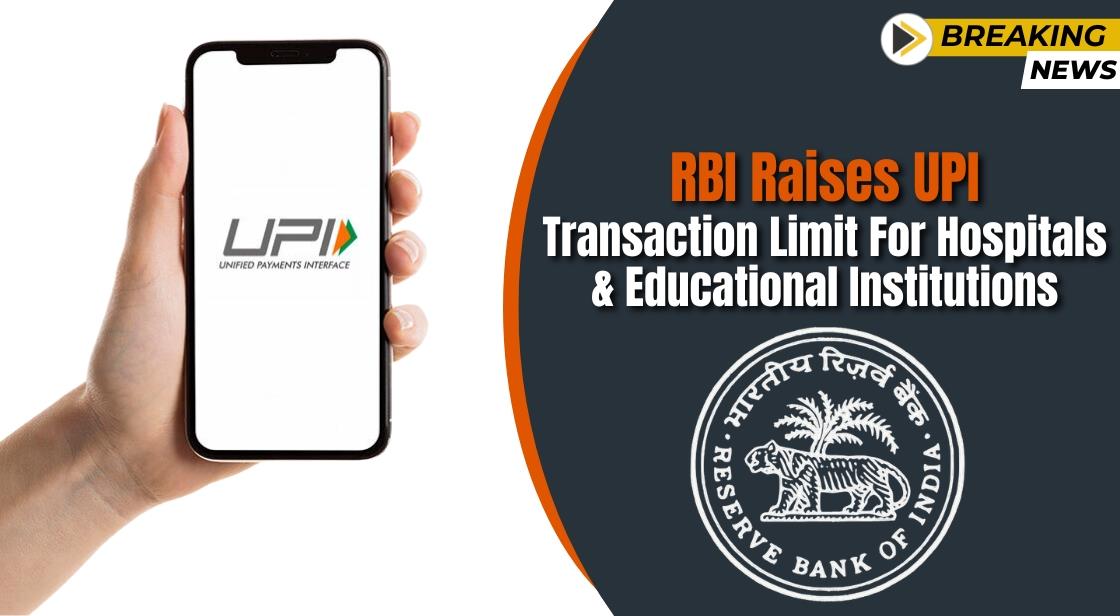RBI MPC Meeting: UPI Transaction Limit Raised for Hospitals, Educational Institutions to ₹5 Lakh

News Synopsis
RBI's UPI Transaction Limit Revisions
Reserve Bank of India Governor Shaktikanta Das announced key changes in the UPI transaction limits, aiming to facilitate significant payments to hospitals and educational institutions.
The revision proposes a substantial increase from the existing ₹1 lakh to ₹5 lakh per transaction, intending to empower consumers in making higher-value UPI transactions for essential healthcare and education needs.
Enhancements in e-Mandates for Recurring Payments
Further strengthening the online payment ecosystem, Governor Das outlined enhancements in e-Mandates for recurring payments. The increased limits, now set at ₹1 lakh, target mutual fund subscriptions, insurance premiums, and credit card repayments. This move seeks to streamline and promote recurring payment mechanisms, thereby fostering greater ease for customers.
Monetary Policy Committee's Repo Rate Decision
The RBI's Monetary Policy Committee, after thorough deliberation, decided unanimously to maintain the repo rate at 6.5 percent. Governor Das highlighted the committee's focus on aligning inflation with the set target while providing support for economic growth. The standing deposit facility (SDF) rate remains at 6.25 percent, and the marginal standing facility (MSF) rate and Bank Rate at 6.75 percent.
Projections and Outlook for Indian Economy
The MPC's projections foresee a real GDP growth of 7 percent for FY23-24. Additionally, the Consumer Price Index (CPI) inflation is anticipated to hover around 5.4 percent for FY24. These projections signal a cautious but optimistic outlook, aiming to strike a balance between inflation control and sustained economic growth.
Expectations and Expert Analysis
Anticipations from experts aligned with the RBI's decision to maintain the current short-term interest rates, considering India's inflation within manageable levels and the economy's encouraging growth trajectory. The RBI's steadfastness in maintaining the repo rate marks a consistent stance for the past four bi-monthly policies.
RBI's Rate Adjustments and Global Influences
The last modification to the repo rate occurred in February 2023, concluding a series of rate hikes initiated due to global disruptions post the Russia-Ukraine conflict. This adjustment aimed to tackle heightened inflation resulting from global supply chain disruptions, showcasing the RBI's proactive measures in stabilizing the domestic economy.
MPC Committee Dynamics and Governance
RBI Governor Shaktikanta Das led the RBI MPC meeting from December 6 to December 8, involving six members, including both external representatives and RBI officials. Alongside Governor Das, the committee comprises key RBI officials and external members, collectively contributing to pivotal decisions concerning India's monetary policy.
Relevant and Latest Facts:
1. UPI Transaction Limit Increase:
-
Category: Hospitals and Educational Institutions
-
Old Limit: ₹1 lakh
-
New Limit: ₹5 lakh
-
Effective Date: Immediate
2. E-mandate Limit Increase:
-
Category: Mutual Fund Subscriptions, Insurance Premium Subscriptions, Credit Card Repayments
-
Old Limit: ₹15,000
-
New Limit: ₹1 lakh
-
Effective Date: Immediate
3. RBI Repo Rate Unchanged:
-
Current Rate: 6.5%
-
Date of Announcement: December 8, 2023
-
MPC Voting: 5-1 in favor of maintaining the rate
4. GDP and Inflation Projections:
-
Fiscal Year: 2023-24 (FY24)
-
Projected Real GDP Growth: 7%
-
Projected CPI Inflation: 5.4%
Additional Relevant Facts:
-
This is the first change in the UPI transaction limit for specific categories since February 2023.
-
The increase in the e-mandate limit is expected to benefit over 50 million mutual fund investors and 30 million insurance policyholders.
-
The RBI's decision to maintain the repo rate reflects its continued focus on controlling inflation while supporting economic growth.
-
The projected GDP growth of 7% for FY24 is higher than the International Monetary Fund's (IMF) projection of 6.1%.
You May Like









